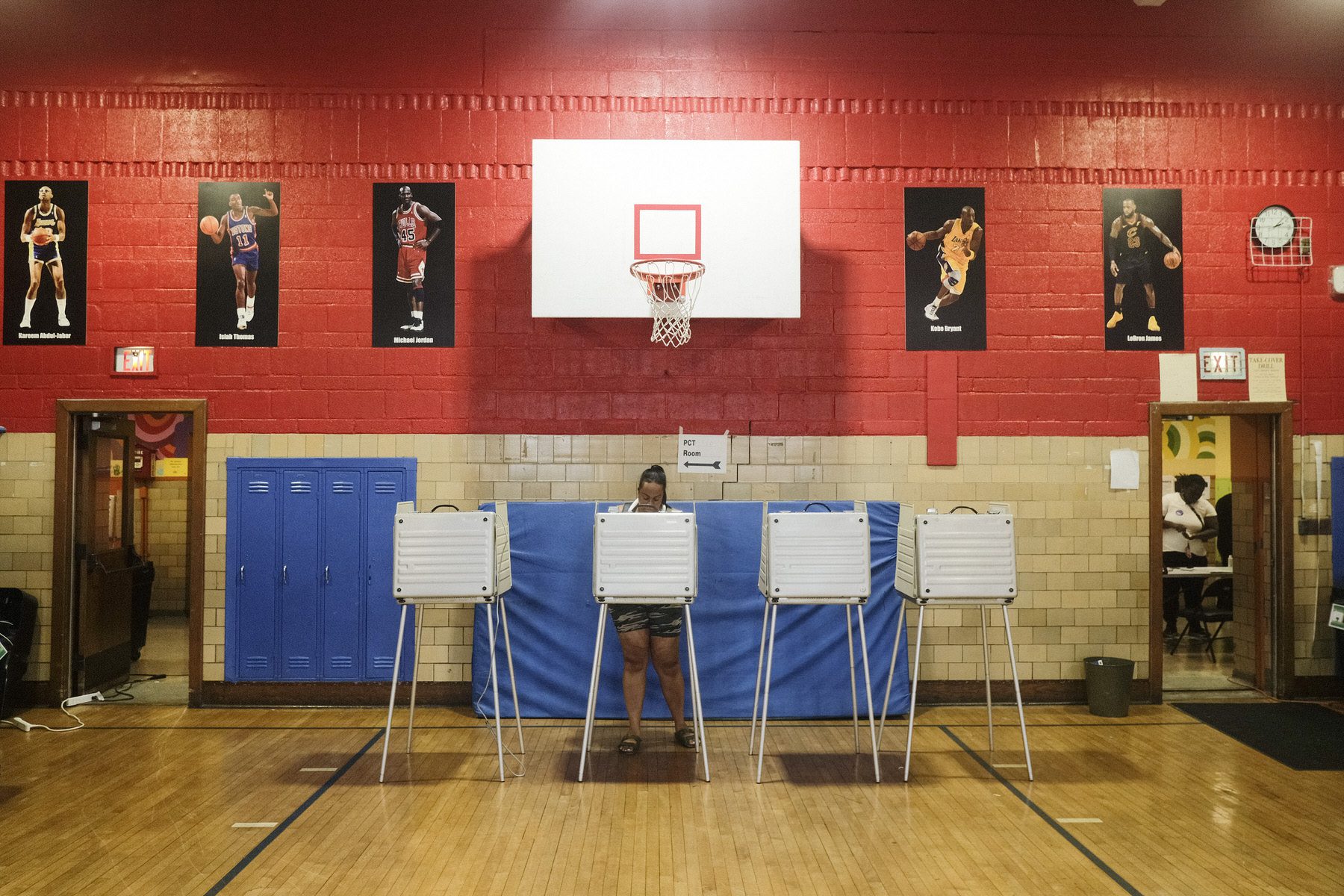This month marks two landmark anniversaries for voting rights: the ratification of the 19th Amendment to the U.S. Constitution, which in 1920 gave women the right to vote — though largely only White women had access to the ballot — and the passage of the Voting Rights Act of 1965, which expanded access to the franchise for women of color.
These milestones were on my mind this week, with less than 100 days to go until the midterm elections. I wondered how this week’s contests in Arizona, Michigan, Kansas, Missouri and Washington bring into sharper focus the potential representation of women at the state and federal levels.
Women make up more than half the population and the electorate but only 27 percent of Congress. But as women are increasingly stepping up to run across parties and up and down the ticket, open questions remain about how that representation translates into power.
This week, Democrats are likely to pass legislation with billions of dollars in funding for climate change, health care and the ability for Medicare to negotiate prescription drug prices. But the most diverse Congress in history has been stymied on issues from caregiving to maternal health to abortion to the pay gap.
Women continue to face barriers to governing at the state level, where no Black woman has ever been elected governor, and while the number of women who are serving as governor is a record, that record is a paltry nine.
Can this cycle help to expand the electorate’s imagination about who should govern and what women’s leadership looks like? Will 2022 build on the gains of recent cycles? So far, the primaries are shaping up to produce mixed results, with women poised to lead in places where the political power appears to be shifting.
Coming out of Tuesday’s primary, there are now five women-versus-women matchups for governor — tying the number of all-woman contests for the job for all of U.S. history prior to this year.
“When we look at gubernatorial races right now, there’s an increased importance in terms of who holds statewide executive positions due to the allocation of power to the states in regard to some of the most highly debated issues,” including abortion, education and voting rights, said Kelly Dittmar, director of research at the Center for American Women and Politics. “In all of these ways, the gubernatorial role is only stronger, and therefore, when you think about a representative democracy, making sure our gubernatorial offices are more representative of the constituencies they are meant to serve is vital. This has been the site of a lack of representation for all of our history.”
In Congress, the more likely scenario is not another record year, but a “potential stasis year,” Dittmar said. The numbers are a reminder that despite the gains of the last two cycles, the work to get closer to or reach gender parity in Congress continues.
As states consider legislation to make voting easier or more difficult, to expand or restrict abortion access, and to make it easier or harder for gender, sexuality and race to be discussed in schools, governors have played a major role. Eight of the nine women now serving as governor are running for reelection this fall. A record 66 women, including 36 Republicans, have filed to run for governor.
Tuesday’s primaries added two all-woman gubernatorial contests in November. In Michigan, Tudor Dixon won the GOP primary and will face incumbent Democratic Gov. Gretchen Whitmer, and Kari Lake won the Arizona Republican primary and will face Democrat Katie Hobbs. Alabama, Iowa and Oregon also have woman-versus-woman contests.
About three dozen women overall are still in the running in gubernatorial races. Both Stacey Abrams in Georgia and Deirdre DeJear in Iowa are running to be the country’s first Black woman governor. Groups on both sides of the aisle see taking states’ top posts as key for women’s representation — and for advancing their ideas.
“Hopefully, we continue to showcase women’s leadership and help get more of them elected to higher and higher office,” said Christina Reynolds, spokeswoman for Emily’s List, which backs Democratic women candidates who support abortion access. “We have a larger problem electing women to executive office than legislative office. You’ll invite them to your group projects, but you won’t always let them be the leader.”
The 2020 election set new highs for the proportion of women serving in Congress — 27 percent, or 144 of 539 members — building on the record 2018 midterms, which also ushered in a number of diverse women firsts. While Democrats made many of the gains in 2018, Republican numbers were boosted after 2020.
This year, a record 69 women filed to run for Senate, including 38 Republican women — also a high, according to the Center for American Women and Politics. In the U.S. House, 249 GOP women candidates have filed to run, up from 227 in 2020.
Kaitlin Makuski, political coordinator for Susan B. Anthony’s List, a group that works to elect anti-abortion candidates, cheered the trend, and said it has been “phenomenal having so many vocal women advocates in the GOP.”
“We started as a PAC to elect pro-life women because we understand they bring unique perspective to the life issue,” said Makuski, whose group backed candidates like Dixon in Michigan for governor. “Women aren’t on one side or the other. There needs to be representation on both sides. Especially in a post-Dobbs era, women are recognizing that our elected leaders will have the ability to pass life-saving legislation across states and in Congress, and that our voices need to be at the table for the unborn and their mothers.”
So far, 15 incumbent women, including 12 Democrats and three Republicans, won’t return to the U.S. House. Two — Carolyn Bourdeaux of Georgia and Marie Newman of Illinois, both Democrats — lost their primaries to other incumbents after redistricting forced them to face off. Michigan Rep. Haley Stevens beat Rep. Andy Levin in a Democratic member-on-member primary this week.
No incumbent women in the Senate are retiring or seeking another office this year.
Dittmar said redistricting doesn’t appear to have a gendered impact this cycle, but can be one more obstacle to improving underrepresentation among women candidates.
Nine women are retiring from the House, at least some, in part, due to the redrawn maps after the 2020 Census. Rep. Brenda Lawrence of Michigan, for example, mentioned redistricting as a factor in declining to seek a fifth term in Congress. Her departure leaves the Michigan congressional delegation with no Black members.
A few are running for other offices: Florida Democrat Val Demings is challenging Sen. Marco Rubio in the fall. Missouri Republican Vicky Hartzler, who left to run for Senate, lost in Tuesday’s GOP primary. And California Democratic Rep. Karen Bass is running to become Los Angeles’ first Black woman mayor.
The decade after the Voting Rights Act of 1965 was passed saw seismic changes in gender equality and women’s representation in our democracy and society, from the passage of Title IX, to Shirley Chisholm’s historic run for president, to the landmark Roe v. Wade Supreme Court decision.
Black women have worked to shape democracy even before gaining full access to the ballot, and over the last half century, they have become a political powerhouse at the polls as the most loyal and consistent voting bloc in the Democratic Party. But that output hasn’t always translated into input: Despite being 7.6 percent of the population, Black women are just 4.3 percent of all members of Congress. There are currently no Black women serving in the U.S. Senate.
There have been notable wins, including Kamala Harris’ ascent to the vice presidency as the country’s first Black woman in the role. Justice Ketanji Brown Jackson was nominated and confirmed as America’s first Black woman to serve on the Supreme Court. And Black women are serving as mayors in seven of the 100 most populous cities in the country.
More than 130 Black women — a new record — ran for the U.S. House in 2022, and a record number of AAPI and Latina candidates also ran for governor this cycle.
Higher Heights co-founder Glynda Carr said Black women are poised to win at a time when their voices matter more than ever.
“This can’t be the election cycle where we have policy losses and a loss of representation,” said Carr, whose group works to elect Black women. “We’ve got to double down to ensure that we change representation this cycle and have leadership in place to meet the moment.”
More than a century after the passage of the 19th Amendment, the power of representation at the polls was on display in Kansas, where voters in the state’s primary rejected a proposed state constitutional amendment that would have ended abortion protections in the state. Tuesday’s vote was the first opportunity for voters at the state level to weigh in on the issue since the Supreme Court overturned Roe v. Wade and ended federal abortion protections.
The Kansas primary saw record turnout for a midterm election, with a reported 1,000 percent increase in voter registration on June 24, the day of the high court’s Dobbs v. Jackson Women’s Health Organization decision. According to political data collection agency TargetSmart, women were 70 percent of the Kansans who registered to vote after the Dobbs decision.
Reynolds said the outcome in Kansas this week is proof that abortion is an issue that will galvanize women and have a major impact in the fall.
“The power of women in general is going to be proven a lot,” Reynolds said. “We’re going to continue to see it. Women are not standing back and letting this happen.”
Women are not a monolith; they bring different lived experiences to elected office than the men who have long dominated our politics and determined our policy. The midterms hold a new opportunity to explore questions of electability, leadership and gender.
Women vote at higher rates than men, and while not all women voters or candidates back abortion access, their representation on the ballot and at the ballot box is a chance for all of their voices to be heard on this issue.







